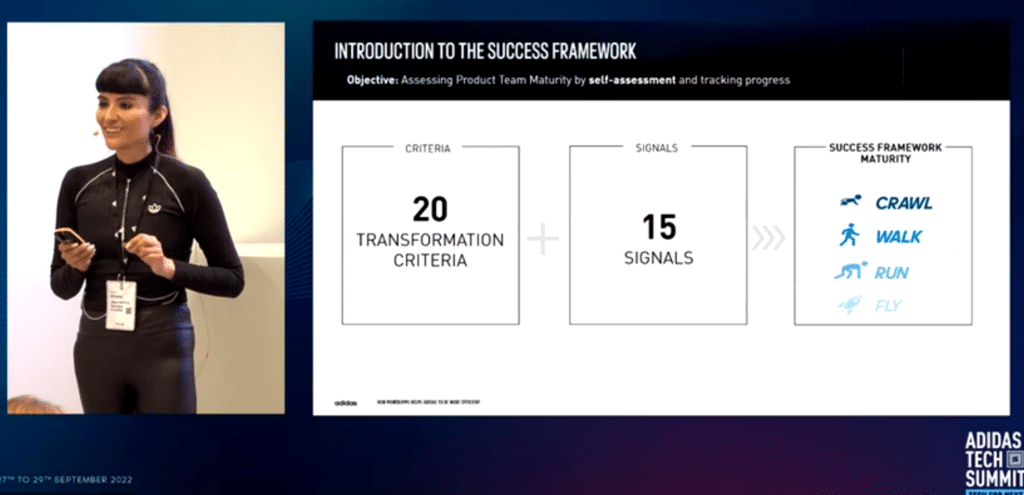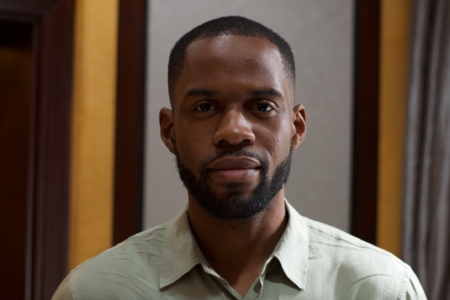
As one of the most well-known brands on earth, Adidas has built a reputation for producing clothing and gear for fitness enthusiasts across all levels. Most recently, it’s been lauded for its inclusive approach to sports — allowing anybody, regardless of background, gender or race, to have equal access to fitness and, with this, create a healthier, happier society.
It is this inclusive, global approach that makes a career at Adidas attractive to many — including international graduate Olga Ramírez. Born and raised in the city of Cusco, Peru, Ramírez has carved out an exciting career for herself at Adidas.
However, despite its global presence, the Peruvian hadn’t always been looking for a role with the sports and lifestyle brand. In fact, she initially started out working in tech at a firm in Germany.
“A couple of months in, I was told that things were not looking good [because of the pandemic], and they would most likely be letting people go very soon,” she tells Study International. “Because I was a recent hire, they advised me to start looking elsewhere.”
While Ramírez was devastated, she started looking at other options. She soon saw that Adidas was hiring. She took her chance and applied.
It paid off. She was brought on as a project manager — and it wasn’t long before she started seeing just how global Adidas is. “Sometimes when I’m travelling, or out, and I see an advert of a campaign, it hits me on how much of a global presence we have,” she shares. “It’s overwhelming!”

Ramírez won a scholarship to study for an MBA at Alliance Manchester Business School, UK. Source: Olga Ramírez
Translating her love for tech into business
Despite her current success at Adidas, Ramírez’s first love has always been tech. “When I was younger, I loved working with code and playing around with its reactions and this was some of my earliest steps into IT,” she says.
Ramírez chased her passion and pursued her undergraduate studies at the Pontifical Catholic University of Peru. Her journey within the tech world was more than smooth — she was well-regarded by her mentors, one of whom called her “a really good technical person.” Still, it was this comment that struck a chord within her.
“It was as if I was a useful and trustworthy service,” she says. “Weeks later, I followed up on why she described me in this way, and she highlighted to me that despite my abilities in IT, I was lacking in people-orientated and business skills. I had become too comfortable with the tech.”
Ramírez knew then that she had to expand her skill set beyond just working with computers. She applied for and won a scholarship to study for an MBA at Alliance Manchester Business School in the UK.
There, Ramírez thrived. She found the course enriching and insightful, as well as useful in preparing her for the working world. She was presented with the MBA Citizenship Bronze Award for developing the university’s wider community relations.
“Unlike computers, business is packed full of differences: different opinions, different people, different ideas,” she explains. “I found a real love for this and working with people who saw the world differently from me. It’s become really important to me, and any innovation we break through is an amalgamation of the different backgrounds of people in my team, produced through collaboration.”
“I think back to when I was referred to as just a ‘technical person’ — well now because of my MBA, I’m so much more,” she says. “It helped me translate my tech knowledge into the practical, business world.”

Ramírez with her soccer mates in Manchester. Source: Olga Ramírez
From Peru to Manchester, UK
Adjusting to a UK university was thought. Small differences made her anxious, like navigating a different currency and opening a foreign bank account. Others, like getting used to academia in the UK, were harder still.
“Academia and studying are very different in the UK to back home in Peru,” she says. “In much of Latin America, we lack a lot of resources and finances, and so academia can tend to be not as thorough as in the UK. For example, projects happen a lot quicker in Peru and are not as rigorously prepared for. There was so much more planning that went into my studies at Alliance Manchester, and I had to adjust to this.”
Still, the biggest eye-opener was the diverse and open culture in Manchester — something she had never experienced before.
“In Peru, everyone is Catholic,” she shares. “But in Manchester, I learned and was met with people of so many different faiths and nationalities. It was amazing – people who practised religions and celebrated days I had never experienced previously. I learned so much about Asian cultures from my student colleagues, for example, things that I had never even heard of. I really loved this, I felt like I was experiencing multiple new worlds at once.”

Ramírez now works at Adidas, an opportunity granted to her due to her MBA. Source: Olga Ramírez
On building a career at Adidas
Carving out a professional career during such unprecedented times can be a daunting challenge for many. Fortunately, Ramírez found that the pandemic worked in her favour. “Because of the pandemic, the company has seen a rapid digitalisation of its business, so I quickly found myself in my current role as a Senior Agile Coach,” she says. “And I love it – it really was meant to be!”
Beginning her career at Adidas has been an eye-opening experience. “Seventy percent of my team are from outside of Germany, which is phenomenal,” she says. “No two people come to the table with the same ideas. It can prove challenging; just recently I was working with a team based here in Germany, Shanghai and Bogota, Colombia.”
It’s an environment that’s been cultivated out of the brand’s recent announcement to ensure diversity, equity and inclusion across all its branches. “I love that diversity is so important to Adidas,” Ramírez shares. “Forty percent of the people working in tech here are women – which is lightyears ahead of some other companies. You don’t get it everywhere, and I don’t think I would have stayed so long had it not been.”
Still, Ramírez explains that her current successes would not have been possible without a background in business — something she gained whilst studying for her MBA. Her greatest takeaway? The work experience that was tied into her programme was a great help in preparing for the working world in Europe.
“Working in Europe is different to the way we work in Peru,” she explains. “In Latin America, all businesses care about is cutting costs – there’s not a huge amount of money, so a priority is always making sure everything is as cheap and efficient as possible. But by doing work experience, I discovered organisations here also care about improving services, which was a shift for me. But I’m glad I learn this before joining Adidas.”
Carving out her next steps
Alongside her career at Adidas, Ramírez is now working towards a Doctorate in Business Administration. Her goal? To find out why more women in Europe are working in IT compared to Peru.
“I want to find out what causes this, in terms of policy, culture, etc,” she says. “For example, in Germany, maternity leave is nine months long, but in Peru, it’s only three. This makes a huge difference to working women.
“In a way, I’m doing this research to talk to the younger me; to identify all the challenges I faced in Peru. I want to take my findings back to Peru, work with universities and help provide a platform for the next generation of IT women in Peru. But to do this, I really need to be an expert in the field, and so this is another way that the DBA is helping me.”
Her advice to students who hope for a career at Adidas or a similar achievement is “Don’t be scared.”
“If there is a course you are in love with but you’re being held back by grades or finances, just start the application process,” she says. “You’ve got nothing to lose. Apply for it, apply for the scholarship, just start the process and make the decision later.”










